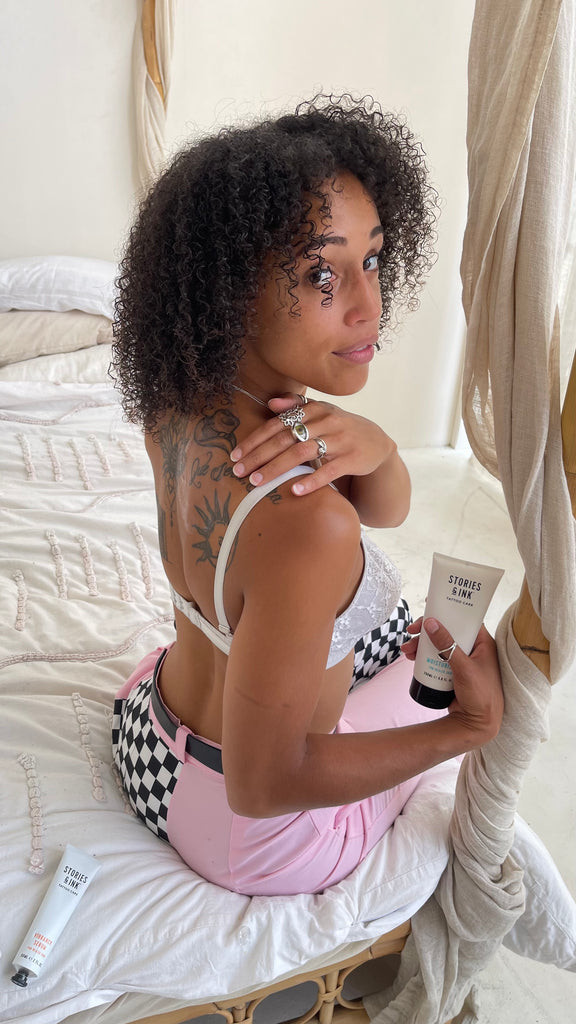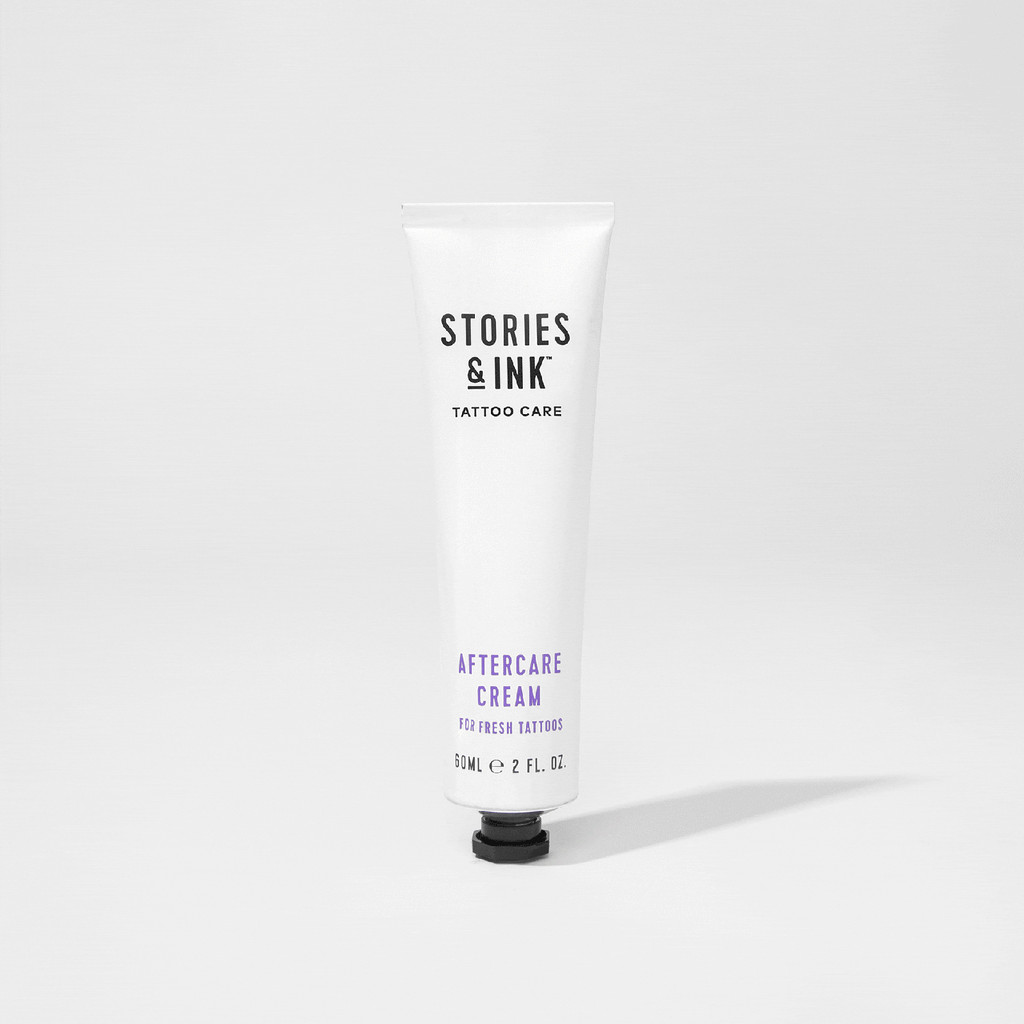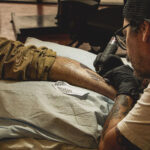Can You Scratch An Old Tattoo? No, you should avoid scratching an old tattoo, as it can damage the skin and affect the tattoo’s appearance. Instead, tattooat.com offers valuable insights and solutions for managing tattoo itching, ensuring your body art remains vibrant and healthy. Discover expert tips and aftercare recommendations to relieve discomfort and maintain the integrity of your inked skin. Explore the best tattoo care practices for lasting beauty, and learn about tattoo preservation.
1. What Causes Itching in Old Tattoos?
Itching in old tattoos is often caused by dry skin, allergic reactions, or environmental factors. To keep your tattoos in pristine condition, understand that these elements can irritate the skin and cause discomfort. According to the American Academy of Dermatology, dry skin is a common cause of itching.
- Dry Skin: As skin ages, it naturally loses moisture, leading to dryness and subsequent itching.
- Allergic Reactions: Allergies to certain fabrics, soaps, or environmental allergens can trigger itching.
- Environmental Factors: Changes in weather, such as dry winter air, can exacerbate skin dryness and itching.
2. Understanding the Tattoo Healing Process
The tattoo healing process involves several stages that can cause itching. Understanding these phases helps manage the discomfort effectively. Typically, a new tattoo goes through distinct healing phases, each contributing to the itching sensation.
- Inflammation Phase: Immediately after getting a tattoo, the skin becomes inflamed, leading to redness and tenderness.
- Scabbing Phase: Scabs form over the tattooed area as the skin begins to heal.
- Peeling Phase: As the skin regenerates, the scabs start to peel off, causing intense itching.
- Regeneration Phase: The final stage involves the skin fully recovering, with the itching gradually subsiding.
3. New Tattoo vs. Old Tattoo Itch: What’s the Difference?
The causes and management of itching differ between new and old tattoos. Recognizing these differences is crucial for proper care. New tattoos itch primarily due to the healing process, while old tattoos often itch because of skin conditions or external irritants.
| Feature | New Tattoo | Old Tattoo |
|---|---|---|
| Primary Cause | Healing process, inflammation, scabbing | Dry skin, allergies, environmental factors |
| Duration | Typically 1-3 weeks | Varies, often persistent or recurring |
| Symptoms | Redness, swelling, scabbing, intense itching | Itching, dryness, occasional redness |
| Recommended Care | Gentle washing, moisturizing, avoiding direct sunlight | Regular moisturizing, avoiding irritants, antihistamines (if necessary) |
4. Why is My Old Tattoo Itching and Raised?
If an old tattoo is itching and raised, it could indicate an allergic reaction, infection, or scar tissue formation. Consulting a dermatologist is essential for accurate diagnosis and treatment. According to dermatologists at the University of California, San Francisco, raised tattoos can be a sign of inflammation or an allergic response to the ink.
- Allergic Reaction: The body might react to the tattoo ink years after the initial application.
- Infection: Although rare, an infection can occur if the skin is compromised.
- Scar Tissue: Keloids or hypertrophic scars can cause itching and elevation.
5. What Happens If I Scratch My Old Tattoo?
Scratching an old tattoo can lead to skin damage, infection, and distortion of the tattoo’s appearance. Avoid scratching and implement alternative methods to relieve itching. Scratching can break the skin, introducing bacteria and potentially leading to infection, according to the National Institutes of Health.
- Skin Damage: Scratching can cause abrasions and irritation, leading to further discomfort.
- Infection Risk: Broken skin increases the risk of bacterial or fungal infections.
- Tattoo Distortion: Repeated scratching can damage the ink and distort the tattoo’s design.
6. How to Relieve Itching on Old Tattoos: Effective Methods
To relieve itching on old tattoos, focus on moisturizing, avoiding irritants, and using cold compresses. These methods help soothe the skin and reduce the urge to scratch. Proper care can maintain the tattoo’s appearance and prevent further irritation, as highlighted by the American Academy of Dermatology.
- Moisturizing: Apply fragrance-free, hypoallergenic lotions to keep the skin hydrated.
- Avoid Irritants: Stay away from harsh soaps, perfumes, and allergens.
- Cold Compresses: Use a cold compress to soothe the itchy area.
- Lukewarm Showers: Avoid hot showers, which can dry out the skin.
7. Natural Remedies for Tattoo Itch Relief
Several natural remedies can provide relief from tattoo itching. These include aloe vera, coconut oil, and oatmeal baths, known for their soothing and moisturizing properties. A study published in the Journal of Alternative and Complementary Medicine suggests that aloe vera can reduce inflammation and itching.
| Remedy | Benefits | How to Use |
|---|---|---|
| Aloe Vera | Soothes inflammation, moisturizes skin | Apply a thin layer of pure aloe vera gel to the affected area. |
| Coconut Oil | Hydrates skin, reduces dryness | Gently massage coconut oil into the skin after showering. |
| Oatmeal Bath | Relieves itching, reduces inflammation | Add colloidal oatmeal to a lukewarm bath and soak for 15-20 minutes. |
8. Over-the-Counter Treatments for Tattoo Itching
Over-the-counter treatments like antihistamines and topical creams can help manage tattoo itching. Choose products that are fragrance-free and hypoallergenic to avoid further irritation. According to dermatologists, antihistamines can reduce itching caused by allergic reactions.
- Antihistamines: Oral antihistamines like diphenhydramine (Benadryl) can alleviate itching.
- Topical Corticosteroids: Mild corticosteroid creams can reduce inflammation and itching.
- Moisturizing Creams: Look for creams containing ceramides or hyaluronic acid to hydrate the skin.
9. When to See a Doctor: Identifying Serious Issues
Consult a doctor if your tattoo exhibits signs of infection, severe allergic reaction, or persistent itching. These symptoms may indicate underlying issues requiring medical attention. It is crucial to seek professional help to prevent complications.
- Signs of Infection: Redness, swelling, pus, pain.
- Severe Allergic Reaction: Hives, difficulty breathing, facial swelling.
- Persistent Itching: Itching that does not improve with home remedies.
10. Long-Term Tattoo Care: Preventing Future Itchiness
Long-term tattoo care involves regular moisturizing, sun protection, and avoiding harsh chemicals. These practices help maintain the tattoo’s appearance and prevent future itchiness. Consistent care is essential for preserving your body art, as emphasized by tattoo artists and dermatologists.
- Moisturize Regularly: Keep the skin hydrated with fragrance-free lotions.
- Protect from Sun: Use sunscreen with a high SPF to prevent sun damage.
- Avoid Harsh Chemicals: Stay away from scented products and alcohol-based lotions.
- Stay Hydrated: Drink plenty of water to keep your skin hydrated from the inside out.
11. The Role of Moisturizers in Tattoo Aftercare
Moisturizers play a critical role in tattoo aftercare by keeping the skin hydrated and preventing dryness, which can lead to itching. Choosing the right moisturizer is essential for maintaining the health and appearance of your tattoo. Look for products specifically designed for tattoo aftercare to ensure they contain ingredients that promote healing and protect the ink.
- Hydration: Moisturizers create a barrier that locks in moisture, preventing the skin from drying out.
- Healing: Ingredients like vitamin E and aloe vera can promote skin repair and reduce inflammation.
- Protection: A good moisturizer will protect the tattoo from environmental factors that can cause fading or irritation.
 Woman applying tattoo aftercare cream
Woman applying tattoo aftercare cream
Regular moisturizing with hypoallergenic, fragrance-free lotion helps keep tattooed skin hydrated, reducing dryness and itchiness
12. Choosing the Right Tattoo Aftercare Products
Selecting the right tattoo aftercare products is vital for preventing itching and promoting healing. Look for fragrance-free, hypoallergenic, and non-comedogenic options to avoid irritating the skin. Consulting your tattoo artist for recommendations can also be beneficial.
| Product Type | Key Features | Ingredients to Look For | Ingredients to Avoid |
|---|---|---|---|
| Cleansers | Gentle, fragrance-free, pH-balanced | Mild surfactants, glycerin | Alcohol, sulfates, parabens |
| Moisturizers | Hypoallergenic, non-comedogenic | Vitamin E, aloe vera, shea butter, ceramides | Fragrances, dyes, petroleum-based ingredients |
| Sunscreen | Broad-spectrum, high SPF (30+), water-resistant | Zinc oxide, titanium dioxide | Oxybenzone, octinoxate |
13. Debunking Common Tattoo Myths About Itching
Several myths surround tattoo itching, which can lead to improper care. Understanding the truth behind these myths is essential for maintaining your tattoo. Common myths include the belief that itching means the tattoo is healing correctly or that scratching is harmless.
- Myth: Itching means the tattoo is healing perfectly.
- Fact: Itching is a normal part of healing but can also indicate dryness or irritation.
- Myth: Scratching a tattoo is harmless.
- Fact: Scratching can damage the skin, increase infection risk, and distort the tattoo.
- Myth: All moisturizers are suitable for tattoos.
- Fact: Scented or harsh lotions can irritate the skin and should be avoided.
14. Lifestyle Factors Affecting Tattoo Itch
Lifestyle factors such as diet, hydration, and stress levels can influence tattoo itching. Maintaining a healthy lifestyle can promote skin health and reduce discomfort. Proper nutrition and stress management are essential for overall skin health, as noted in a study by the Mayo Clinic.
- Diet: A balanced diet rich in vitamins and minerals supports skin health.
- Hydration: Drinking plenty of water keeps the skin hydrated.
- Stress: High stress levels can exacerbate skin conditions like eczema, leading to itching.
15. Specific Skin Conditions and Tattoo Itching
Certain skin conditions like eczema and psoriasis can cause tattoo itching. Managing these conditions is crucial for minimizing discomfort. Individuals with pre-existing skin conditions should take extra precautions when getting tattooed, according to the National Eczema Association.
- Eczema: This condition causes dry, itchy, and inflamed skin.
- Psoriasis: Characterized by scaly, red patches of skin.
- Allergic Dermatitis: An allergic reaction causing itchy rashes.
16. Maintaining Tattoo Color and Vibrancy While Managing Itch
Proper care not only relieves itching but also helps maintain the color and vibrancy of your tattoo. Moisturizing and protecting the tattoo from sun exposure are key to preserving its appearance. According to tattoo artists, regular aftercare ensures the tattoo remains vibrant for years.
- Moisturize Regularly: Hydrated skin helps maintain the ink’s vibrancy.
- Sun Protection: UV rays can fade tattoo ink, so sunscreen is essential.
- Avoid Over-Washing: Excessive washing can dry out the skin and fade the tattoo.
17. Tattoo Itching and Seasonal Changes
Seasonal changes can significantly impact tattoo itching. Dry winter air and hot summer sun can both exacerbate skin dryness and irritation. Adjusting your tattoo care routine to suit the season is essential for preventing itchiness.
| Season | Environmental Factors | Recommended Care |
|---|---|---|
| Winter | Dry air, low humidity | Increase moisturizing frequency, use humidifier |
| Summer | Sun exposure, heat, humidity | Apply sunscreen, wear loose clothing, stay hydrated |
18. The Psychological Impact of Tattoo Itching
Chronic tattoo itching can have a psychological impact, leading to frustration and anxiety. Addressing the itching promptly can improve your overall well-being. Persistent itching can affect sleep and daily activities, as highlighted in a study published in the British Journal of Dermatology.
- Frustration: Constant itching can be irritating and lead to frustration.
- Anxiety: Worrying about the cause of the itching and potential damage to the tattoo can cause anxiety.
- Sleep Disruption: Itching can interfere with sleep, affecting overall health.
19. Tattoo Artists’ Recommendations for Itch Relief
Tattoo artists often provide specific recommendations for relieving tattoo itch based on their experience. Following their advice can ensure proper care and prevent complications. Experienced artists often suggest using specific aftercare products and avoiding certain activities during the healing process.
- Follow Aftercare Instructions: Adhere to the guidelines provided by your tattoo artist.
- Use Recommended Products: Choose aftercare products suggested by your artist.
- Avoid Irritating Activities: Refrain from swimming, excessive sweating, and tight clothing.
20. How Tattooat.com Can Help You With Tattoo Aftercare
Tattooat.com offers a wealth of resources, including expert advice, product recommendations, and artist directories, to help you with tattoo aftercare. Explore our site for all your tattoo-related needs. Tattooat.com provides valuable information to ensure your tattoos remain healthy and vibrant, offering design inspiration and connecting you with skilled artists.
- Expert Advice: Access articles and guides on tattoo aftercare.
- Product Recommendations: Discover top-rated tattoo aftercare products.
- Artist Directory: Find experienced tattoo artists in your area.
Address: 1825 SW Broadway, Portland, OR 97201, United States.
Phone: +1 (503) 725-3000.
Website: tattooat.com.
 Stories & Ink tattoo aftercare cream
Stories & Ink tattoo aftercare cream
Stories & Ink Aftercare Cream is hypoallergenic, fragrance free, 100% vegan and cruelty free
FAQ About Tattoo Itching
1. Why does my old tattoo itch suddenly?
An old tattoo may suddenly itch due to dry skin, allergic reactions, or environmental changes. Moisturizing and avoiding irritants can help.
2. Is it normal for a tattoo to itch after years?
Yes, it is normal for a tattoo to itch after years due to skin dryness or allergies. Regular moisturizing can alleviate the itch.
3. Can tattoo ink cause itching years later?
Yes, tattoo ink can cause itching years later if you develop an allergic reaction to the ink. Consult a dermatologist for treatment.
4. How can I tell if my tattoo is infected or just itchy?
Signs of infection include redness, swelling, pus, and pain. If you suspect an infection, see a doctor immediately.
5. What is the best moisturizer for an old tattoo?
The best moisturizer for an old tattoo is fragrance-free, hypoallergenic, and non-comedogenic. Look for products with ingredients like vitamin E or shea butter.
6. Can sun exposure cause tattoo itching?
Yes, sun exposure can cause tattoo itching by drying out the skin and irritating the tattoo. Always use sunscreen to protect your tattoo.
7. Are there any home remedies for tattoo itching?
Yes, home remedies like aloe vera, coconut oil, and oatmeal baths can provide relief from tattoo itching.
8. When should I see a doctor about my itchy tattoo?
See a doctor if you experience signs of infection, severe allergic reaction, or persistent itching that does not improve with home remedies.
9. How can I prevent my tattoo from itching in the future?
Prevent future itching by moisturizing regularly, protecting your tattoo from the sun, and avoiding harsh chemicals.
10. Can stress cause my tattoo to itch?
Yes, stress can exacerbate skin conditions and cause your tattoo to itch. Managing stress through relaxation techniques can help.
Ready to say goodbye to tattoo itching and hello to vibrant, healthy skin? Explore tattooat.com today for design inspiration, connect with talented artists, and discover expert aftercare tips. Don’t let itching dull your ink—find the solutions you need to keep your tattoos looking their best!

